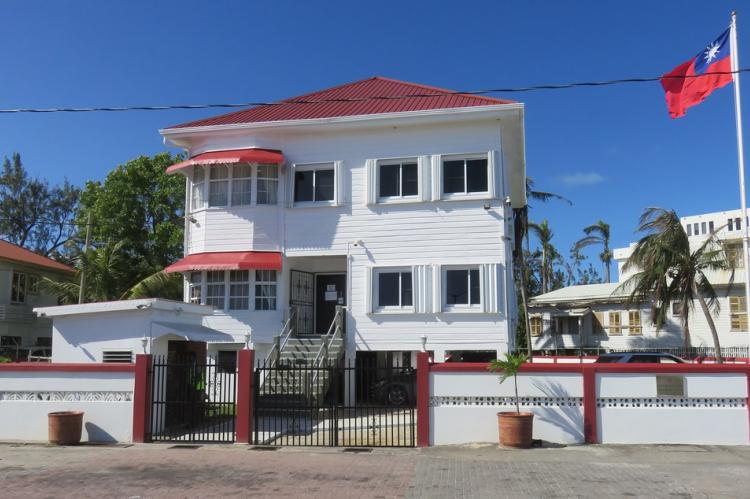Taiwan’s Dollar Diplomacy: A Convenient Exchange for International Support at the People’s Expense
By Omar Silva
Editor: National Perspective Bz DIGITAL 2024
Belize City: Monday 16th September 2024
In the realm of international diplomacy, the term “Dollar Diplomacy” has become synonymous with Taiwan’s strategy to maintain its political allies across the globe. In a world where geopolitics plays an increasingly pivotal role in shaping a nation's global standing, Taiwan has resorted to an age-old practice: paying for friends. Belize, along with Guatemala, remains one of the only two nations on the Central American mainland to support Taiwan's sovereignty in the face of increasing pressure from China. However, what lies beneath this diplomatic relationship is not only problematic but downright dangerous for the health of Belizean democracy and sovereignty.
The Hidden Costs of Taiwan’s Dollar Diplomacy
While Taiwan’s financial contributions to Belize are often cloaked in the rhetoric of aid and development, a deeper look reveals a troubling pattern of manipulation and political interference. Through the use of registered NGOs, Taiwan channels millions of dollars into select government projects that conveniently align with the interests of political elites. These sums—delivered under the guise of bilateral cooperation—have become tools for keeping the present government in power and ensuring Taiwan’s international support in the United Nations and other global fora.
Taiwan's support, however, is not aimed at benefiting the people of Belize or Guatemala. Instead, it is designed to secure political backing by propping up regimes that are willing to exchange sovereignty for cash. In Belize’s case, much of this money is funnelled through organizations that serve as umbrellas for foreign agents, distributing funds to government ministers while bypassing the very democratic processes that should ensure accountability and transparency.
A Government’s Convenience, A Nation’s Cost
This type of financial “assistance” does not just raise eyebrows—it raises serious ethical, moral, and legal concerns. We are witnessing the systematic corruption of Belize’s political system, where foreign funds are used to tilt the playing field in favor of those in power. Taiwan’s millions are not improving the lives of ordinary Belizeans; they are entrenching political elites and strengthening their grip on power.
The Leader of the Opposition, Moses “Shyne” Barrow, has rightly raised objections to Taiwan’s interference in Belize’s domestic politics. Barrow revealed that funds from Taiwan were channelled through an NGO headed by none other than the Prime Minister’s sister, totalling around $3 million. These funds, intended for “development projects,” conveniently find their way into government constituencies just before election cycles—buying influence, support, and ultimately, votes. This is not aid; this is electoral manipulation at its finest.
What’s worse, attempts to investigate this corruption—such as the inquiry launched by the Financial Intelligence Unit (FIU)—have been squashed, with senior officials removed from their posts. This deliberate stifling of accountability is alarming and suggests a far deeper issue at play: the complicity of those in power with foreign actors.
Taiwan’s Agenda: Convenience, Not Cooperation
Let us be clear—Taiwan’s actions are not those of a benevolent partner helping to develop a fellow nation. Rather, this is diplomacy for convenience. By buying the support of Belize and Guatemala, Taiwan secures its international backing, giving the illusion of robust diplomatic relationships while knowing full well that such alliances are maintained through cold, hard cash. The Taiwanese Embassy in Belize, a conduit for this funding, has become the epicentre of a financial transaction masquerading as diplomatic cooperation.
The people of Belize do not benefit from this relationship; they receive nothing but the leftovers after government elites have siphoned off the majority for their own political purposes. Infrastructure, healthcare, education—areas where genuine development aid could make a profound difference—are left wanting, while the political class pockets the windfall.
This model of diplomacy not only erodes trust in foreign partnerships but also undermines democracy at its core. When foreign dollars are used to manipulate elections and bolster regimes, the will of the people is silenced. This type of foreign interference goes against every principle of democracy and good governance.
The Broader Regional Implications
Belize is not alone in this disturbing pattern. Across Latin America and the Caribbean, Taiwan’s dollar diplomacy has ensnared other nations in similar deals, where the political elites reap the rewards while the masses remain impoverished. The consequences of this strategy go beyond Belize and Guatemala, as these deals promote an international system where smaller, developing nations are pawns in the geopolitical game between Taiwan and China.
But what happens when the political tides shift? What happens when the ruling party that has profited from Taiwan’s financial assistance loses power? The answer is simple—Taiwan’s financial commitment evaporates, leaving behind a hollow shell of promises that were never truly intended for the people.
The Urgent Call for Change
We must call out Taiwan’s dollar diplomacy for what it is: an opportunistic form of bribery that undermines the sovereignty of nations like Belize. This strategy benefits the few while the majority remain neglected and voiceless. If Taiwan truly seeks to build strong, lasting relationships with Belize and other nations, it must do so through transparent, ethical partnerships that prioritize the welfare of the people over the political gain of a few.
The time has come for Belize to reassess its relationship with Taiwan and demand that any future cooperation be grounded in accountability, transparency, and a genuine commitment to improving the lives of Belizeans. It is also time for regional governments across Latin America and the Caribbean to stand together and reject the exploitation of their nations for international convenience.
Diplomatic relationships must be based on mutual respect, not financial coercion. Anything less is a disservice to the people we are elected to serve.
- Log in to post comments

